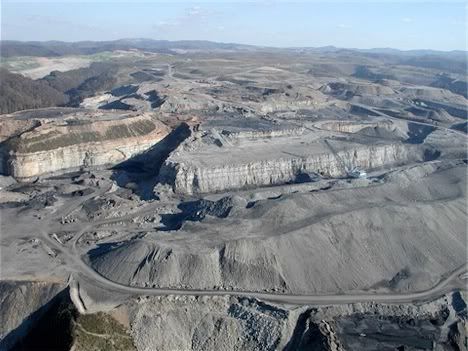 One point that constantly comes up when the push to 100% sustainable, renewable power is raised is the problem that “renewable power sources cannot be relied on to deliver power 24/7”. This is a talking point pushed by the propagandists for Big Coal in particular, since the biggest challenge to their long term existence as an industry in the United States is the threat that we begin to get serious about tapping our abundant Wind Power resources on-shore in the Great Plains and Mountain West and off-shore on the Great Lakes and Atlantic Coast. When the wind is blowing, it substantially undermines the market for fossil-fuel “Baseload Power” (see (The Myth of Baseload Power).
One point that constantly comes up when the push to 100% sustainable, renewable power is raised is the problem that “renewable power sources cannot be relied on to deliver power 24/7”. This is a talking point pushed by the propagandists for Big Coal in particular, since the biggest challenge to their long term existence as an industry in the United States is the threat that we begin to get serious about tapping our abundant Wind Power resources on-shore in the Great Plains and Mountain West and off-shore on the Great Lakes and Atlantic Coast. When the wind is blowing, it substantially undermines the market for fossil-fuel “Baseload Power” (see (The Myth of Baseload Power).
After all, consider two scenarios, one in which a power source replaces half of the power from coal by replacing half the power, all of the time, and a second, in which a power source replaces all of the power, half the time. The second is a greater threat to coal-fired power, since it swings the advantage to natural-gas fired power. Natural-gas fired power is presently killing off coal-fired plant construction, and a sufficiently large and volatile supply of Windpower would make that permanent.
So of course Big Coal spreads the idea that all sustainable power is volatile and if its volatile, it can’t provide all of our power.
This present essay is not about answering that argument rationally. That was the topic of The Myth of Baseload Power. This present essay is about attacking the political foundations of Big Coal.
After all, propaganda about “Clean Coal” and spreading the myth that there is this special kind of power called Baseload power that sustainable energy has impact because of the political influence of Big Coal in Coal Country. And this is a particularly pernicious influence, since it runs on a cycle of:
- Coal production provides export base employment in an area.
- Coal production also diverts a majority of the value-added from production out of the production area;.
- which helps assure that the Coal production areas are, on average, lower income economies than elsewhere in the country;
- which undermines the area’s capability to diversify its economy, helping to assure that the jobs in Coal production are valued jobs in the local area, which increases local political support for “supporting” Big Coal;
- And with a less diversified economy, there are fewer resources available to contest the political power and influence of Big Coal.
- With its political power, Big Coal ensures that the rules in place continue to ensure that a majority of value-added is drained out of the production area
This essay is about undermining that political power at its base, by creating more jobs from a direct rival to coal production than Big Coal can offer. Once a better deal is made available, with more employment, more value-added circulating locally, and no destruction of people’s health through the hauling up of poisonous by-products from underground, the foundation on which Big Coal’s political power is based is in a position to fracture.
What is that direct rival to coal production? Bio-coal production.
 The topic for this week’s Sunday Train was brought to my mind when I listened to the Energy Gang podcast. They were discussing the question of whether “CSP (that is, concentrated thermal solar power) is dead”, and the always entertaining, but not uniformly informative, “energy futurist” Jigar Shah declared that “CSP is dead” (segment starts 30:29), backing the claim up with a set of bullet points that fell far short of supporting the claim. And listening to the set of bullet points, it seemed to me that he was talking in the context of the phase of the transition to renewable energy that we are presently in, and ignoring the phase of the transition that we will have to pass through if we are to survive as a national economy and national economy.
The topic for this week’s Sunday Train was brought to my mind when I listened to the Energy Gang podcast. They were discussing the question of whether “CSP (that is, concentrated thermal solar power) is dead”, and the always entertaining, but not uniformly informative, “energy futurist” Jigar Shah declared that “CSP is dead” (segment starts 30:29), backing the claim up with a set of bullet points that fell far short of supporting the claim. And listening to the set of bullet points, it seemed to me that he was talking in the context of the phase of the transition to renewable energy that we are presently in, and ignoring the phase of the transition that we will have to pass through if we are to survive as a national economy and national economy.
 This week’s Sunday Train is a trio of shorter topics. The first is a research development project to develop a modern steam train to run on biocoal. The target is a sustainable steam train that, as a headline grabber, will attempt to run at 130mph and break the world steam train speed record. There’s much to like about this research development project … but I am going to argue that biocoal to operate trains is not it.
This week’s Sunday Train is a trio of shorter topics. The first is a research development project to develop a modern steam train to run on biocoal. The target is a sustainable steam train that, as a headline grabber, will attempt to run at 130mph and break the world steam train speed record. There’s much to like about this research development project … but I am going to argue that biocoal to operate trains is not it. Second, SF’s MUNI transport agency is one of the ten agencies slated to split $760m in Prop1a(2008) bond funds improvements to systems interconnecting with the planned High Speed Rail system. The balance of the $950m goes to the three existing Amtrak California intercity rail services, the Capitol Corridor, the San Joaquin, and the Surfliner.
Second, SF’s MUNI transport agency is one of the ten agencies slated to split $760m in Prop1a(2008) bond funds improvements to systems interconnecting with the planned High Speed Rail system. The balance of the $950m goes to the three existing Amtrak California intercity rail services, the Capitol Corridor, the San Joaquin, and the Surfliner. And third, a speculative look at an alternative technology that SF MUNI might deploy that money on, that actually would connect with the HSR system at the Transbay Terminal, as well as connecting to BART, the MUNI light rail network, the existing (and proposed alternative) Caltrain terminus at 4th and King, and provide express transit service along Geary Blvd.
And third, a speculative look at an alternative technology that SF MUNI might deploy that money on, that actually would connect with the HSR system at the Transbay Terminal, as well as connecting to BART, the MUNI light rail network, the existing (and proposed alternative) Caltrain terminus at 4th and King, and provide express transit service along Geary Blvd.
Recent Comments